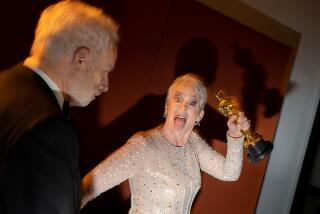Times wins Pulitzers for feature writing, criticism
The Los Angeles Times won two Pulitzer Prizes, American journalism’s top honor, for its coverage of California’s drought and for cultural criticism, Columbia University announced Monday.
Staff writer Diana Marcum won the 2015 feature writing prize for her searing portraits of farmers, fieldworkers and other Californians in drought-stricken towns in the Central Valley.
Mary McNamara, The Times’ television critic and senior culture editor, won the prize for criticism.
Times Editor Davan Maharaj said the honors spoke to his staff’s resiliency and commitment to excellence in the face of sweeping and often jarring changes in the news industry.
“These prizes are a tribute to two supremely talented journalists,” he said. “They’re also a testament to the newsroom’s dedication to producing the highest-quality journalism and to serving our community.”
The Times has now won 43 Pulitzer Prizes.
The Daily Breeze of Torrance won the award for local reporting for its investigation into corruption in the Centinela Valley Union High School District, including exorbitant compensation paid to the superintendent. He collected $663,000 last year, more than twice as much as his peers in larger neighboring districts, the paper reported.
It was the first Pulitzer for the Los Angeles News Group, which publishes the Breeze and eight other daily papers.
Among other winners, the New York Times was awarded three Pulitzers: for feature photography, international reporting and investigative reporting (an award it shared with the Wall Street Journal).
The Pulitzer Gold Medal for Public Service went to the Post and Courier in Charleston, S.C., for its series “Till Death Do Us Part,” which explored the high rate of violence against women in South Carolina.
At the Los Angeles Times’ downtown newsroom, journalists gathered at noon Monday to follow a live-streamed announcement from New York of the Pulitzer board’s decisions in 14 journalism categories, plus seven prizes in letters, drama and music. The newsroom erupted in cheers and applause as the names of the paper’s two winners were heard.
Marcum, who is based in Fresno, wrote piercingly of the financial and emotional toll of the drought in California’s agricultural heartland. She thanked Times colleagues whose news reports on the four-year drought provided the framework for her narrative explorations and character studies.
“I’m getting to go out and write the people stories that I love to write, but they’re doing all of the bedrock stuff that lets people know why this is really important,” Marcum said.
In one story from her winning package, she profiled 68-year-old Fred Lujan, a “gentleman farmer” in the town of Terra Bella who “called his pistachio trees his babies, his girls, and gave them names.”
As the drought stretched into its third year, the local irrigation district sealed off his water meter. “How am I supposed to just sit here and watch everything turn brown and die?” Lujan asked Marcum.
A former columnist for the Fresno Bee, Marcum became a staff writer for The Times in 2011 — an ambition she said she had harbored since elementary school. She had freelanced for the paper off and on for years.
In the criticism category, McNamara was honored for columns on the death of Joan Rivers, on Stephen Colbert’s departure from Comedy Central, on the media circus attending the Sochi Olympics and myriad television shows.
The Pulitzer judges praised her use of “shrewdness, humor and an insider’s view to show how both subtle and seismic shifts in the cultural landscape affect television.”
She frequently ranged beyond critiques of TV shows to examine cultural controversies that included whether on-screen sexism plays a role in real-world violence.
“To argue that entertainment does not impact culture is absurd,” she wrote. “Hollywood doesn’t get to take credit for breaking ground with films such as ‘Philadelphia’ and shows like ‘Will & Grace’ or for that matter ‘Girls,’ only to wash its hands of more destructive attitudes.”
In a column celebrating the diversity of such non-cable shows as Fox’s “Sleepy Hollow,” she wondered why “prestige” cable had not shown similar progress in “embracing the rainbow.”
And in a column exploring the joys of the series “House of Cards,” she noted that Netflix released Season Two on Valentine’s Day, adding: “Binge-watching has become the new sex.”
McNamara joined The Times in 1990 and covered the film industry for four years before becoming a television critic eight years ago. She was a finalist for the Pulitzer Prize for criticism in 2013 and again in 2014.
In remarks to jubilant colleagues, McNamara thanked her editor, Martin Miller, and expressed gratitude for the freedom to train her critical eye on diverse subjects.
“I’ve written for every section but the sports section, and I wrote for the sports section this year, so that was totally exciting,” McNamara said.
Austin Beutner, publisher and chief executive officer of The Times, praised the “particular clarity” of the winners’ voices and said their journalism “gives me my motivation to keep working at this” — a reference to his efforts to find new audiences and revenue sources.
In addition to the winners, Times journalists were finalists for Pulitzer prizes in two other categories.
Reporter Richard Marosi and photojournalist Don Bartletti were finalists in international reporting for their series “Product of Mexico,” which explored harsh working conditions at export farms in Mexico. The stories prompted a coalition of Mexican growers and Wal-Mart, the world’s largest retailer, to promise better treatment of laborers.
The Times was also a finalist in breaking news reporting for its staff coverage of the May 2014 Isla Vista massacre. The staff mobilized reporters in the middle of the night to cover a young man’s armed rampage near the UC Santa Barbara campus that left seven dead, including the killer.
The Pulitzer board awarded the fiction prize to “All the Light We Cannot See” by Anthony Doerr, a novel about a blind French girl and a German boy whose lives intersect in occupied France.
The history prize went to Elizabeth A. Fenn’s “Encounters at the Heart of the World: A History of the Mandan People,” described by the judges as “an engrossing, original narrative” about a Native American tribe in the Dakotas.
In the biography category, the winner was “The Pope and Mussolini: The Secret History of Pius XI and the Rise of Fascism in Europe,” by David I. Kertzer, and in general nonfiction the prize went to “The Sixth Extinction: An Unnatural History,” by Elizabeth Kolbert.
christopher.goffard@latimes.com
More to Read
Start your day right
Sign up for Essential California for news, features and recommendations from the L.A. Times and beyond in your inbox six days a week.
You may occasionally receive promotional content from the Los Angeles Times.







